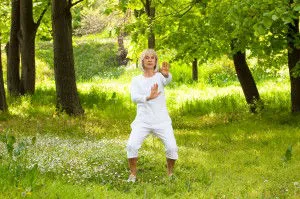Dementia is a condition that severely affects the quality of life of many elderly individuals and their families. New research performed at Teesside University in the United Kingdom has found that a holistic program focusing on both physical and mental health may help to improve the lives of these individuals in several ways.
According to the Geriatric Mental Health Foundation, almost 10 percent of people over the age of 65, and nearly half of those over the age of 85, have some form of dementia. The most common form of this ailment in elderly individuals is Alzheimer’s disease, which is characterized by depleted nerve cells in the cerebral cortex, the brain’s center of reasoning, language and memory.
For their study, Teesside University researchers developed a holistic exercise program known as the Happy Antics program. This program includes cognitive exercises, physical exercises including movements based on the disciplines of yoga, tai chi and qigong, as well as guided mindfulness meditation. Study participants consisted of eight individuals with dementia, five caregivers and two volunteers who did not have dementia.
The study’s lead researcher, Dr. Yvonne J-Lyn Khoo, explains, “when the wellness approach is applied to exercise, holistic exercise strives to encourage individuals not only to take part in the physical activities, but also to become aware of their own physical and psychological states, and to perform exercise that is purposeful and meaningful to them.”
On the results of the study, Khoo reports, “observations at the sixth session showed that even though people with dementia could not remember what had occurred during previous sessions, six people with dementia who participated in the holistic exercise sessions could anticipate the physical movements associated with specific music and three people with dementia were able to remember the sequence of the physical movements. This showed potential in maintained procedural memory among people with dementia who attended the holistic exercise sessions.”
Furthermore, participants found the program enjoyable, and felt socially engaged. Some participants reported enhanced relaxation and pain relief following the sessions.

While it is not a cure, or an encompassing solution, combining physical and mental activity on a regular basis may offer some hope for dementia sufferers to live an enhanced quality of life.
-The Alternative Daily
Sources:
http://www.elsevier.com/about/press-releases/research-and-journals/study-shows-dementia-patients-benefit-from-holistic-exercise-program
http://www.eurekalert.org/pub_releases/2013-12/w-ebf120313.php
http://www.gmhfonline.org/gmhf/consumer/factsheets/dementia_factsheet.html
